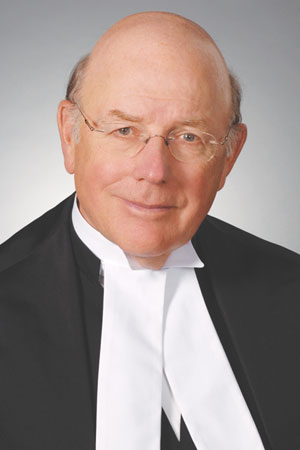With former Ontario chief justice Warren Winkler now out of the job for more than a month, some prominent lawyers are making predictions on who will replace him.

Toronto lawyer Clayton Ruby thinks Ontario Court of Appeal Justice Gloria Epstein has a good shot at the job.
“She’s got the experience and she’s a woman. It’s time for a woman,” he says.
Personal injury lawyer John McLeish has heard rumours suggesting Superior Court Associate Chief Justice Frank Marrocco will fill Winkler’s shoes. Marrocco is “very capable” and one of “the practical guys who get it,” says McLeish.
Civil litigation lawyer James Morton admits his discussions about the next chief justice with even the most plugged-in judges didn’t yield any leads. “I have a feeling this is one that the government is keeping very close to the chest,” he says. The appointment may well be a surprise for everyone, he adds.
“Historically, they have appointed people who are unexpected. So I wouldn’t be surprised if we see somebody from the Superior Court. I wouldn’t be surprised if we see somebody from private practice.”
For whoever gets it, the job won’t be easy, lawyers suggest. According to Morton, the next chief justice will face new challenges as some judges are openly criticizing government decisions and the public takes more interest in what they have to say. A good example is the recent judicial resistance to the federal government’s victim surcharge rules, says Morton.
“That’s going to be a challenge the new chief is going to have to face,” he says. “Judges are going to be more in the public scrutiny, more than before. There are certainly noises of activist judges from some of the politicians and how to deal with that and maintain Canada’s historic respect for judges. . . . That’s going to be a challenge.”
The chief justice will also be under increased scrutiny, according to Morton.
“The chief justice has a curious role. [The role] is different from that of other judges because the chief has a public ceremonial job. Your typical judge isn’t supposed to go out and talk about things, but the chief is supposed to go out and talk about things. I think the new chief will be facing increasing scrutiny in terms of media, [including] social media.”
For Ruby, top on the to-do list for the next chief justice should be improving access to justice.
“From my perspective, the greatest issue is legal aid,” he says.
“We slash the income eligibility levels for legal aid to the point where it’s given to almost no one. And secondly, we provide so little in terms of preparation time [for legal aid counsel] that we’re giving third-rate legal aid for the poor, and that’s a humiliation for the entire system of justice.”
Both the provincial and federal governments need to step up with more funding, Ruby says, and “someone needs to organize that. No one seems willing to speak for the poor.
“There are a huge number of people who are poor or middle class but don’t qualify for legal aid and they don’t get justice.”
Bringing Ontario’s courts into the 21st century should be another priority for the chief justice, says Morton.
“The courts are becoming progressively more adept at the electronic world. I think it’s fair to say that they’ve moved into the mid-1990s and the new chief is going to have to see how to move the court from where it is now, which is still basically a paper-based court,” he says.
Doing so will be tough, Morton admits. After the Integrated Justice Project, which saw “hundreds of millions of dollars” going to waste on a failed attempt to computerize the province’s courts, there’s a lot of resistance to spending money on technology, he says.
“But the court system will collapse if it doesn’t become electronic and the new chief is going to have to become a champion of technology and evolution.”
Age-old issues such as lack of judicial resources are still on the radar. To add to the chief justice’s challenges, delays in the civil justice system have reached unacceptable levels, says McLeish. In fact, Marrocco is one of the two judges Superior Court Chief Justice Heather Smith appointed to come up with solutions to growing civil litigation delays. The other judge is Superior Court Justice Geoffrey Morawetz.
“Both Justice Marrocco and Justice Morawetz are very practical guys who get it. They know what the problem is and they are looking for ways to fix the problem. It just doesn’t rest on their shoulders alone. They’re going to need help from the profession,” says McLeish, noting the chief justice will need to help rally people around the efforts.
Winkler managed to move the court along in significant ways, according to Morton, “so the new chief has big shoes to fill. I think it’s going to be a tough job.”
McLeish agrees: “It’s a very challenging job for anybody. It does take someone with very strong managerial, administrative, and people skills. It has to be someone who gets it.”
Winkler, meanwhile, has secured a new job for himself. Last week, Arbitration Place announced he had joined the firm as a resident mediator and arbitrator.
For more, see "'
Great judicial mediator' set to retire."

 Toronto lawyer Clayton Ruby thinks Ontario Court of Appeal Justice Gloria Epstein has a good shot at the job.
Toronto lawyer Clayton Ruby thinks Ontario Court of Appeal Justice Gloria Epstein has a good shot at the job.